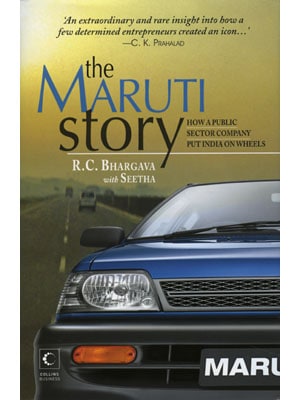
The Maruti Story
A rare insight into how a few determined entrepreneurs created an icon
Even from the outside, the story behind India’s “people’s car” is a fascinating one. This book is a first-person account by R.C. Bhargava of his stint at Maruti, where he was actively involved from the inception of the idea until his retirement as chairman of the board in 1997.
 Right through, it is not his story-telling ability or his ghost-writer’s craft that will keep you reading; it is the sheer honesty of the man. For example, on Indira Gandhi’s support, he says, “Everyone knew…that if she found anyone interfering with the progress of the project, or hurting its prospects of being successful, the consequences could be quite serious.”
Right through, it is not his story-telling ability or his ghost-writer’s craft that will keep you reading; it is the sheer honesty of the man. For example, on Indira Gandhi’s support, he says, “Everyone knew…that if she found anyone interfering with the progress of the project, or hurting its prospects of being successful, the consequences could be quite serious.”
As a PSU, Maruti had more than a few problems with its political masters. Like in May 1995, when K. Karunakaran, the then industries minister, expressed distrust of the intentions of Maruti management and Suzuki. Bhargava doesn’t mince words: “…few of them have hands-on experience or understanding of technology and what is required to make a business profitable and competitive…the relative short tenures dealing with commercial decision making prevent building expertise. While they have authority over the decisions made by a public sector board, and can exercise a virtual veto at board meetings, they have no accountability. Usually they get transferred, or retire, before the results of their actions can be evaluated.”
Bhargava also spends many pages clearing his own name: His integrity was under the scanner by the Central Bureau of Investigation (CBI) in 1995-96. (This was extensively reported at that time, and eventually he was cleared.) His perspective on the fine balance needed to run a PSU and avoid conflicts of interest, and his insider view of significant incidents in the company’s history, make for a very satisfying read for anyone interested in the auto industry. For a layperson, though, the excessive detailing could get in the way of the narrative.
The Maruti Story; R.C. Bhargava & Seetha; HarperCollins India; Hardback; 408 pages; Rs. 499
(This story appears in the 30 November, -0001 issue of Forbes India. To visit our Archives, click here.)




